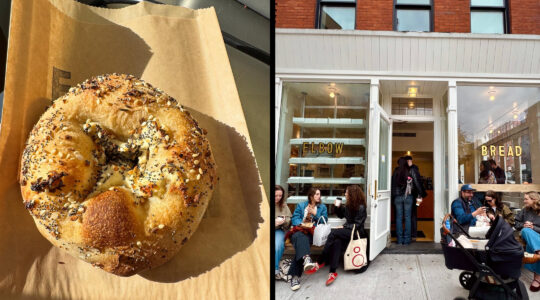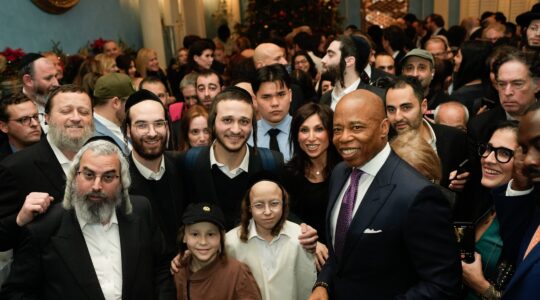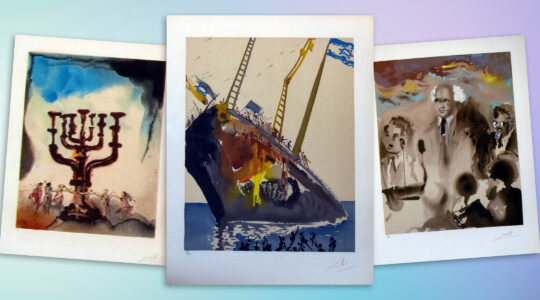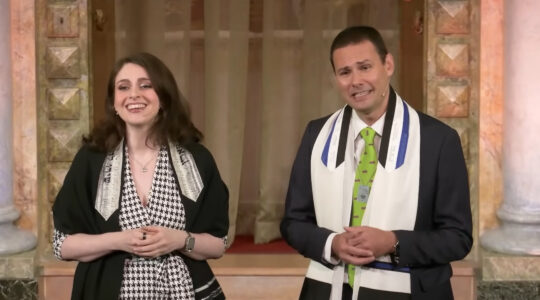“And from the last remnant of the oil flasks, a miracle was wrought for the Jewish people, and the Sages established eight days for song and jubilation” [Ma’oz Tzur].
What is the most worrisome threat facing the Jewish people today? A nuclear-armed Iran and its terrorist proxy organization, Hezbollah, on Israel’s borders? Or is it perhaps epidemic levels of estrangement from traditional Jewish life, leading to sky-high assimilation and intermarriage rates in the diaspora? Both certainly have the capacity to inflict significant damage to our long-term future. Let us search for an answer by pondering the miraculous victory of Chanukah, and the lessons it conveys.
Jewish history doesn’t repeat itself, but it rhymes, to paraphrase the famous aphorism. Indeed, we see in the Maccabee rebellion more than 2,000 years ago similar, though not identical, themes. The Maccabee rebellion had two components: One, an internal struggle against a Hellenized Jewish leadership that desired to transform Judea into a Greek city-state, trading in the one God of Israel for the pantheon on Mount Olympus. And two, an external battle against Greek-Syrian domination over the struggling Judean state.
Candlelighting, Readings:
Shabbat Candles: 4:11 p.m.
Torah: Genesis 41:1-44:17; Numbers 7:30-41
Haftarah: Zechariah 2:14-17; 3:1-4:7
Havdalah: 5:15 p.m.
There is a fascinating halachic detail concerning the proper location of the menorah (or “chanukiah,” as it is known in modern Hebrew) that puts our issue into sharp focus. Being mindful of the fact that the purpose of lighting Chanukah candles is “pirsumei nissa,” publicizing the miracle of the holiday, the Talmud rules that “it is a mitzvah to place the Chanukah light by the door of one’s home on the outside.” This will ensure optimal viewing by a maximum audience, thereby fulfilling pirsumei nissa in the best fashion.
The Talmud then acknowledges that logistics may render this impossible for some, so it adds, “If one dwells on an upper floor, he should place it at the window nearest the street.”
However, our Sages conclude, the rules change in a time of danger, in which case “it is sufficient to place it on the table” [Talmud Shabbat 21b]. In his halachic compendium “Aruch HaShulchan,” Rabbi Yechiel Michel Epstein points out even though the public will not see the Chanukah light, there is no problem, since the mitzvah of publicizing the miracle in our times is directed toward the members of the household.
Support the New York Jewish Week
Our nonprofit newsroom depends on readers like you. Make a donation now to support independent Jewish journalism in New York.
In contrast, “Har Tzvi,” the responsa of former Chief Rabbi of Jerusalem Rav Tzvi Pesach Frank, states that the custom in Jerusalem (and indeed the custom of most families in Israel) is to light the chanukiah outside the front door. Can these two starkly differing opinions be reconciled?
We can explain this by noting that Chanukah fundamentally celebrates a victory over both aforementioned threats to Jewish survival. The latter threat was an enemy from within, the threat of assimilation at the hands of Jewish Hellenists so desperate to become Greeks that they went through surgical procedures to erase the signs of circumcision.
Assimilation, the phenomenon of taking on the total identity of a host culture, from language to values to abandoning one’s religion, had penetrated even the most sacrosanct chambers of the Jewish nation, the Holy Temple itself. A Jew named Menelaus, an extreme Hellenist who had plundered the gold vessels of the Temple, even bribed Greek-Syrian King Antiochus to become High Priest over Judea.
The rebellion of the Maccabees thus represented a double victory; a miracle that had to be publicized in the Temple as well as at home, for the outside world as well as for our own families.
I would go a step further and say that in fact, the “Aruch HaShulchan” and “Har Tzvi” are not disagreeing as much as placing emphasis on different aspects of the same truth. Namely, only if we succeed within our own families to inculcate the faith of our unique Jewish destiny do we have a chance to succeed in a military and ideological battle with the nations of the world.
We must understand that being a light unto the nations and being a light unto one’s family is not a contradictory proposition. If we can convey this vital message to Jews who currently relate to Chanukah as not much more than a Jewish parallel to another winter holiday, we will have discovered not only a means of stemming estrangement from Jewish life, but also a source for a resurgence of pride in our own traditions and mission to the world. This would indeed be an authentic Chanukah victory in our generation.
Rabbi Shlomo Riskin is chancellor of Ohr Torah Stone and chief rabbi of Efrat.
The New York Jewish Week brings you the stories behind the headlines, keeping you connected to Jewish life in New York. Help sustain the reporting you trust by donating today.




